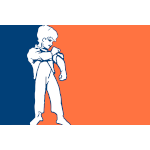Language Day in Orania Date in the current year: August 14, 2026
 In the middle of South Africa, there is a small town named Orania that was founded by Afrikaners (descendants of Dutch, German and French settlers). Oranians do not recognize South African national holidays and celebrate their own holidays instead. One of these holidays is Language Day (Taaldag), observed annually on August 14.
In the middle of South Africa, there is a small town named Orania that was founded by Afrikaners (descendants of Dutch, German and French settlers). Oranians do not recognize South African national holidays and celebrate their own holidays instead. One of these holidays is Language Day (Taaldag), observed annually on August 14.The language of Afrikaners is Afrikaans, previously known as Cape Dutch. It is a Germanic language spoken in South Africa, Namibia, and, to a lesser extent, in some other African countries (Botswana, Zambia and Zimbabwe). It has evolved from the Hollandic dialect of Dutch spoken by European settlers and their slaves.
The Afrikaans language evolved during the 18th century. However, for a long time it was considered a vulgar dialect of the Dutch language, often referred to as mutilated Dutch (geradbraakt Nederlands), broken Dutch (gebroken Nederlands), uncivilized Dutch (onbeschaafd Nederlands), or incorrect Dutch (verkeerd Nederlands). Another common epithet was “kitchen language” (kombuistaal), since Afrikaans was a lingua franca for settlers and their slaves.
The Afrikaans language movement first emerged in the late 19th century, but Afrikaans wasn’t recognized as a distinct language until the early 20th century. Even after the formation of the Union of South Africa in 1910, it was Standard Dutch that was declared an official language, and not Afrikaans. Finally, the Official Language of the Union Act was passed in 1925, declaring Afrikaans an official language.
Today, Afrikaans is the majority language of the Northern Cape and Western Cape provinces of South Africa. It is the third-most-spoken language in South Africa after Zulu and Xhosa, with about seven million native speakers, which amounts to 13.5% of the country’s population.
The role of Afrikaans in South African society has diminished since the fall of Apartheid; today, English is the most widely understood language in the country and the primary language used in parliamentary and state discourse. Nevertheless, Afrikaans is recognized as one of South Africa’s official languages, alongside English, Zulu, Xhosa, Sepedi, Tswana, Southern Sotho, Tsonga, Swazi, Venda, and Southern Ndebele.
To preserve the Afrikaans language and Afrikaner culture, a group of Afrikaners established the settlement of Orania in 1990. Its inhabitants do not recognize South African national holidays. Instead they commemorate important dates from the history of the European colonization of South Africa.
For instance, Language Day commemorates the formation of a society that jump-started the Afrikaans language movement. The Genootskap van Regte Afrikaners (“Society of True Afrikaners”) was founded on August 14, 1875 in Paarl. It published the first Afrikaans-language newspaper, Die Afrikaanse Patriot, as well as various books.
Language Day in Orania celebrates the Afrikaans language and literature. It is marked by various cultural events aimed to raise awareness of the status of Afrikaans and the importance of its preservation.
- Category
- Cultural Observances
- Country
- South Africa
- Tags
- Language Day in Orania, holidays in Orania, holidays in South Africa, cultural observances, Afrikaans